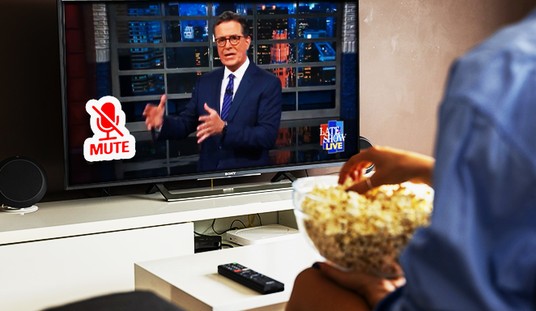The data comes from a Brookings Institute paper dealing with the nature of opposition to immigration reform and a sub-section from E. J. Dionne and William Galston on political polarization and the media, all of which is interesting — but not quite as interesting as the results of this survey. The most-trusted name in news for all Americans is, unsurprisingly, Fox News, which also has the highest ratings by far in the industry. Broadcast news — the three networks — come in a close second, with CNN a more distant third place. However, the “honor” of being the least-trusted name in news, in practically every demographic, is MSNBC, a subsidiary of NBC News — which ranks below Jon Stewart among all but Democrats.
Here’s the chart that lays out the bad news for Comcast, in answer to the polling question: “Which of the following television news sources do you trust the most to provide accurate information about politics and current events?”
Almost as many liberals and Democrats identify Fox as their most trusted news source as MSNBC; with liberals, it’s presumably in the margin of error. That’s certainly the case among Democrats with Jon Stewart. It looks like a toss-up between which version of comedy they want to experience.
Interestingly, though, the area of most consensus is still the venerable broadcast-news programs. Clearly, Republicans and conservatives favor Fox, but broadcast news gets the most even distribution of trust on partisan and ideological grounds. The alphabets get a little more trust from Republicans than independents, who spread their trust rather evenly between the broadcast networks, CNN, and public television — although the plurality chooses Fox first. In contrast, MSNBC is a fringe choice in all demographics, and comes in next to last even among its target demos of Democrats and liberals.
Dionne and Galston note that jobs and the economy dominate the priorities of all groups in their analysis, and that immigration reform — the central focus of the lengthy Brookings effort — isn’t really a big priority for Americans:
There is a paradox in our politics at the moment. It is obvious that our political system is deeply polarized and that the political parties advocate very different approaches to core issues such as health care and the economy. Yet at the same time, Americans across partisan, ideological, and demographic lines largely agree on the relative importance of the challenges we face.
The people as a whole see the acceleration of job creation as the top priority, with reducing the budget deficit and health care costs also scoring high. Enacting immigration reform and addressing climate change trail far behind, while dealing with moral breakdown occupies a middle position.
When we turn to subgroups, some surprising results emerge. For example when asked to rate particular issues as a highest, high or lower priority, only 36% of Hispanics regard immi- gration reform as a highest priority, compared to 62% who list jobs as the highest priority and 49% who cite health care costs. In fact, there are few differences over priorities across racial and ethnic lines. By substantial margins, whites, African-Americans, and Hispanics care most about job creation and least about immigration and climate change. All three groups rank moral breakdown fourth on the list of six. Whites and men as a whole care more about the deficit than about health care costs, while the reverse is the case for African-Americans and women.
One might have expected issues such as climate change and immigration reform to score high among young adults. Not so: only 22% gave a “highest priority” rating to climate change and even fewer (17%) to immigration reform. Only 29% of self-described liberals view climate change as a highest priority issue, and only 22% put immigration reform in that category.
What would make for an interesting research paper would be to compare the air time accorded to these priorities by each of these media outlets. I’d hypothesize based on casual observation that MSNBC probably spends a highly disproportionate amount of time on low-priority issues like climate change and immigration reform, while the more trusted outlets actually report on issues about which Americans across all demographics care — jobs, the economy, and the disastrous effects of ObamaCare. That could be one reason why those outlets gain more trust in dealing with breaking news than MSNBC does in any context.









Join the conversation as a VIP Member